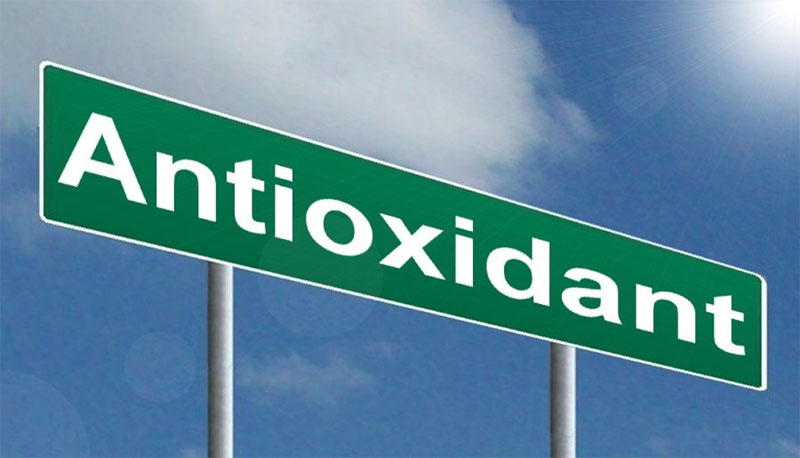Antioxidants are said to protect us from harmful influences such as UV rays and are often referred to as a wonder weapon against skin ageing and diseases such as cancer. We will explain what antioxidants are and list the foods that contain them. We will also tell you when you should avoid antioxidants.
Whether it is intense UV radiation or exhaust gases, we are exposed to a wide range of environmental influences every day. They can be dangerous to our health because they release free radicals. These are predatory oxygen compounds that penetrate the body and can damage healthy cells. Fortunately for us, there are effective countermeasures called antioxidants.
What are Antioxidants?
Antioxidants neutralize free radicals and ensure a tough cellular casing in an organism. Some antioxidants can be made by humans, while others have to be ingested through food. The latter include secondary plant substances, trace elements such as zinc and selenium and several vitamins.
Antioxidants are radical scavengers
To understand what are antioxidants, it is crucial to know their function in our body. Antioxidants can make free radicals in the body harmless. Free radicals get into our body through UV solar radiation, exhaust gases, smoking, radioactive radiation or medication. Some of the free radicals are also produced by our body through metabolic processes, especially when there is a lot of stress.

Free radicals are unstable oxygen compounds that lack an electron. To be complete again, they are looking for molecules from which they can snatch an electron. If a free radical gets into the body, it steals the required electron from a cell and leaves it dead. This process is known as oxidation.
A healthy immune system can usually keep free radicals at bay and get rid of damaged cells. Too many free radicals can overwhelm the body and cause oxidative stress. More and more cells are robbed of their electrons and they in turn attack other body cells. This creates a vicious cycle with more and more defective cells. It can damage genetic material and promote the development of cancer.
Antioxidants can stop this harmful process. Because they release an electron themselves to the free radicals and thereby prevent the body’s own cells from being attacked. They virtually intercept the aggressive molecules and thus prevent oxidation. Hence the name antioxidants. After the release, they now lack an electron themselves, but they don’t get it back from body cells, but from other antioxidants.
Antioxidants can, therefore, prevent the genetic material from being damaged, prevent cells from mutating and sharing in an uncontrolled manner like cancer cells. The skin cells are also protected, which has a positive effect on the complexion. Men who want to have children should also ensure that they have an adequate supply of antioxidants, as these can improve their sperm quality.
When Antioxidants hurt

A balanced diet usually provides us with sufficient antioxidants. Nevertheless, many food manufacturers add artificial antioxidants to their products and advertise them as particularly healthy.
However, too many antioxidants can harm the human body because they neutralize too many free radicals. It is terrible for the body’s defences as our immune system is constantly learning and wants to be challenged. It uses aggressive radicals to better fight viruses, bacteria and other harmful intruders and can thus remove damaged cells from the body. If there are not enough free radicals, the immune system cannot use them in this positive way.
Danger to cancer patients
In cancer patients, taking too many artificial antioxidants can be dangerous because the immune system can also use free radicals to kill cancer cells. However, if there is too little available, there is a risk that the tumour will not be adequately controlled. Some studies even suggest that too many antioxidants in the body can accelerate cancer growth.
Good question: how much is too much?

In a healthy body, the antioxidants predominate and not the free radicals. However, it is not possible to determine what the optimal ratio should look like. It also depends on how much the person is exposed to harmful environmental influences and other risk factors. A healthy diet with lots of vegetables and fruits that provide natural antioxidants normally provides the body with sufficient free radical scavengers.
Foods that have Antioxidants
Once you have understood what are antioxidants and how they are useful in our body, you would certainly want to include them in your daily diet. To fulfil the daily antioxidant requirements, you need to consume food that contains:
- Vitamin C (ascorbic acid) – Orange, Kiwi, Lemon, Guava, Grapefruit, Broccoli, Cauliflower, Brussel Sprouts And Capsicums
- Vitamin E (tocopherol) – Wheat germ oil, Sunflower seeds, Almonds, Sunflower oil and Peanuts
- Vitamin (Beta carotene) – Carrots, Sweet Potatoes, Spinach, Apricots And Bananas
- Polyphenols – Cloves, Cocoa Powder And Dark Chocolate, Berries, Beans And Nuts
- Flavonoids – Blueberries, Plums, Apples, Cherries, Oranges, Strawberries And Spinach
- Selenium – Brazil Nuts, Baked Beans, Oatmeal, Spinach, Milk And Egg
- Zinc – Pumpkin Seeds, Yogurt, Legumes, Legumes, Bananas, Strawberries
Now, you know what are antioxidants and which foods contain antioxidants. Antioxidants are necessary as well as harmful if over-consumed, but you need to ensure that the requirement of the body is fulfilled.


